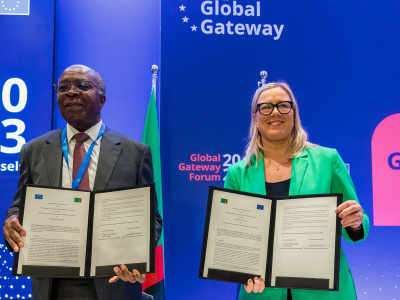
Series: To the new leaders of Europe
With the June 2024 European Parliament elections and the subsequent selection of Europe’s new leaders, the stage is set to reshape the EU’s political landscape. Against a backdrop of shifting geopolitics and escalating global crises, we examine the implications of these domestic political choices for the EU’s international cooperation and foreign policy, exploring the evolving nature of the EU’s global relationships while underscoring the importance of investing in strategic partnerships.
On this page
- Our analysis of the new European Commission
- Our analysis ahead of and after the EU elections
- About the series 'To the new leaders of Europe'
Our analysis of the new European Commission
Following extensive speculation and rising tensions, European Commission president Ursula von der Leyen announced the names and portfolios of her new team on 16 September. The new appointments and division of responsibilities provide insight into the direction for the next five years. But before the new leadership can officially begin, the commissioners-designate must still undergo hearings at the European Parliament, scheduled between 4 and 12 November.
Immediately following Ursula von der Leyen's announcement, we provided initial reactions to the new team in a series of videos. Ahead of and following the hearings, we will examine the implications of the appointments and the division of responsibilities for the EU's foreign and development policy, as well as its global partnerships.
Watch our first reactions to the announcement of the new team
Our analysis ahead of and after the EU elections
After the announcement of the EU election results, we shared our initial reactions in a series of short videos. Leading up to the elections, we produced a commentary series exploring the implications of these domestic political choices for the EU’s international cooperation and foreign policy. It examined how the EU’s relationships with countries worldwide are evolving and underscores the importance of investing in strategic global partnerships.
Watch our first reactions to the election results
About the series 'To the new leaders of Europe'
Our commentary series 'To the new leaders of Europe' looks into the implications of Europe's domestic political choices for the EU’s international cooperation and foreign policy. It explores how the EU’s relationship with countries worldwide is changing and emphasises the importance of investing in strategic global partnerships.
Current projections for the European elections indicate a shift to the right of the political spectrum and potentially more reliance on populists and radical right parties to sustain political majorities. While political dynamics vary by country, European capitals may choose more nationalistic, eurosceptic and populist representatives for posts in Brussels.
As a result, the tone of the next European Commission may differ sharply from the one of the centrist ‘geopolitical Commission’ Ursula von der Leyen inaugurated in 2019. While a scenario in which the EU withdraws from the world is unlikely, we could witness a shift towards a more inward-looking and Western-centric EU. The EU will potentially further deepen an interest-driven, mercantilist and transactional approach towards the rest of the world. Consequently, the integration of EU domestic priorities with external action could intensify and extend beyond initiatives like the Global Gateway strategy and the Team Europe approach.
EU domestic priorities – including migration, competitiveness, job creation, defence and energy security – are gaining greater prominence on the political agenda, signalling changes in how these issues will be addressed. Scaling up support to Ukraine and enhancing the EU's defence capabilities remains a complex and pressing issue. While Brussels is all about geopolitics, EU businesses are showing signs of fatigue with the geopolitical discourse and are pushing for a more pragmatic focus on European competitiveness and jobs. As the likelihood of a second Trump presidency grows, the EU will need to carefully consider its partnerships.
Not everyone in Europe agrees, and some constituencies and member states feel the heat of a more interest-driven EU. Of particular concern is how the EU's values agenda and its commitment to the Sustainable Development Goals will be positioned within this evolving landscape. As the climate crisis is looming, consensus around the EU Green Deal is showing signs of strain. All these challenges will require smart and creative solutions.
Get in touch
Subscribe to our weekly newsletter to receive our latest updates.
If you would like to know more about the series, give us feedback or share your thoughts on specific issues, you can get in touch with Mariella Di Ciommo or the commentary authors. For enquiries related to outreach and media, please contact Virginia Mucchi or Isabell Wutz.


















